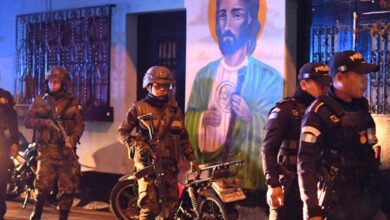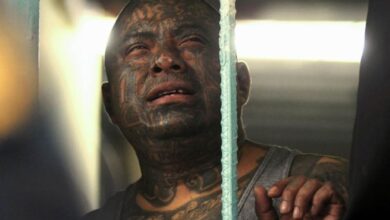In a dramatic turn, Guatemala's President-elect Bernardo Arévalo faces legal challenges over alleged incitement of university protests, sparking concerns about democracy and corruption.

Photo: 11/16/2023.- Guatemala’s president-elect, Bernardo Arevalo, and vice-president-elect, Karin Herrera, participate in a demonstration to denounce the most recent anti-democratic acts of the Public Prosecutor’s Office, at the Plaza de Human Rights in Guatemala City, Guatemala. EFE/Edwin Bercián
The Latin American Post Staff
Escucha este artículo
Leer en español: La agitación política de Guatemala por la lucha de Arévalo contra la corrupción
Arévalo anti-corruption campaign
Guatemalan President-elect Bernardo Arévalo and several members of his Seed Movement party are currently embroiled in a legal battle that threatens the very fabric of the nation's democracy. Prosecutors, spearheaded by Cultural Heritage prosecutor Ángel Saúl Sánchez, are seeking to strip Arévalo and his party members of their immunity. The allegations? Encouraging students to occupy San Carlos University, the country's only public university, via social media posts in 2022.
The backdrop to this unfolding drama is a legal onslaught against Arévalo, an anti-corruption champion who, against all odds, clinched the presidential election in August. This victory, however, did not come without its controversies. The United States government and the Organization of American States have hinted at the possibility that these legal actions might be a ploy to prevent Arévalo from assuming office in January.
Seed Movement Faces Multiple Charges
Since Arévalo's surprise win, prosecutors have aggressively pursued his party on various charges, including alleged irregularities in collecting signatures required for party registration. The party was temporarily suspended by a judge at the prosecutor's behest.
The new case against Arévalo and others includes charges of aggravated usurpation, sedition, and illegal association. These allegations stem from a significant event in April 2022 when students occupied San Carlos University. The students protested what they perceived as a fraudulent election of Walter Mazariegos as rector, alleging that only his supporters could vote. The U.S. State Department later sanctioned Mazariegos, condemning the election as undemocratic.
The student protest, which lasted until June of this year, received apparent support from Arévalo. In a message on a social media platform, Arévalo lauded the protesters, stating, "The USAC is making it possible to see a ray of hope in Guatemala." This message is now a focal point of the prosecutors' case.
Arévalo's Response and Political Divide
In response to these allegations, Arévalo has denounced the Attorney General's actions as "spurious and unacceptable," reflecting a deepening divide in the nation's political landscape. This clash comes in the wake of a resolution by the Organization of American States Permanent Council, which criticized Guatemala's Attorney General's Office as an undemocratic actor attempting to "discredit and impede" the democratic transition of power.
Amidst this tumult, young party activists like Marcela Blanco have taken to social media to voice their distress. Blanco claims that agents arrived at her home to arrest her, adding to the atmosphere of intimidation and fear. In a poignant social media post, she writes, "I am a citizen, I am of the people, and they are doing this to me for speaking against corruption."
Also read: Elections in Guatemala: Between A Novice And Traditional Politics
This situation in Guatemala is more than a mere political scuffle; it's a test of the nation's commitment to democratic principles and the fight against corruption. Arévalo's journey from an anti-corruption crusader to a president-elect embattled by legal troubles symbolizes Guatemala's more significant struggles. The international community watches closely as the nation stands at a crossroads, hoping for a resolution that upholds democratic values and justice.




